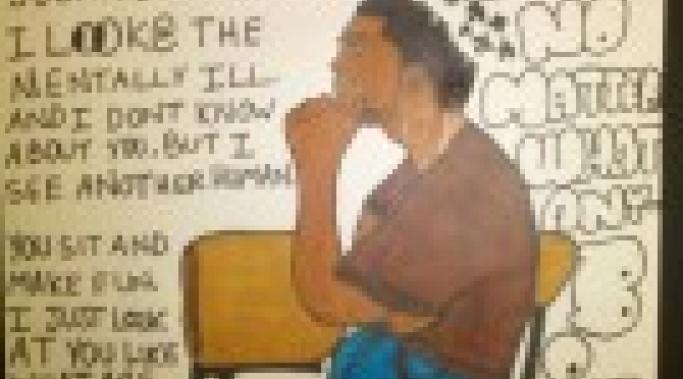"Ben is so lucky to have you."
I hear that a lot, from healthcare providers who often don't even know the families of those they treat and from PAMIs (People Affected by Mental Illness) who usually add one of three things:
their family has given up on them - and they grieve the loss
their family has somehow made their recovery more difficult and they are glad to have broken free from them, or
their family has been a major part of their desire to stabilize, and they are so grateful for the love and support.
One of the most validating things I heard at the NAMI National Convention was this, from the producer of a photo collection called 99Faces Project: that a UCLA psychiatrist was quoted as saying that the most important common link among those in successful recovery was this: someone who loved them anyway, and walked alongside them on the journey.
I plan to be that for my son, carefully balancing, as much as possible, the letting go with the support when needed. That is a tough balance to achieve, but the success is in the desire to do so. This is Ben's journey, not mine, but I do always want him to feel our love.
Recovery in Mental Illness
It’s all over now except for the party - three days of brain overload at the NAMI National Convention in Seattle. Still absorbing the stories we’ve heard, the new research shared, the legal issues and obstacles we are trying to overcome, the many ways this community is trying to make a difference.
One recurring theme, for me, has been hearing mental health stories of recovery and resilience. In so many of these, there seems to be a running thread that I believe is also a huge part of our story: LOVE.
We still hear it sometimes: it's the family's fault.
"They were too demanding during childhood."
"That mother is so overprotective."
"No wonder you have issues; your parents are cold and withdrawn"
"If we can just get you away from your family dynamic, you will recover so much more quickly."
You know, maybe sometimes that is true.
I've had the privilege of meeting many wonderful people who happen to be diagnosed with mental illness and look forward to many more.
There are many stages we go through with any life change, and mental illness is no exception. Families have stages of acceptance, certainly the Person Affected by Mental Illness (PAMI) does too. *
When I talk with a PAMI who is at a stage of acceptance of his mental illness diagnosis, takes her own meds without supervision and is living a functional, productive life, I often ask if there were any particular turning points in their recovery process. In particular, I want to know: Was there a moment when it clicked? When you accepted your diagnosis as true?
Not once - not once! - has anyone said, "My mother finally convinced me I have schizophrenia."
Employer of the Year! There is no plaque, no luncheon, just my undying gratitude for not letting my son's diagnosis of schizophrenia get in the way of keeping him on as a valued employee.
For that, Ben's employer - and any employer with the foresight to see and treat mental illness the same way you'd look at any other illness - gets my personal award for "Employer of the Year."
Thank you.
"Katy Jones" is now a high school student. She might not have made it past the seventh grade, though. It took a watchful teacher and a caring school psychologist to take the action that Katy's family was afraid of: admitting Katy for help when the risk was that "people might think she's crazy."
[caption id="attachment_811" align="alignleft" width="170" caption="a reminder of hope - and the need to be prepared"][/caption]
Today is my son Ben’s 30th birthday. Whoa. How did this happen? I know every parent feels this same sense of disbelief as their children celebrate milestones; still, when your child has dealt with serious illness, that sense of wonder is enhanced by the fear you have felt in the past.
I remember asking myself: will Ben even live to be 30?
I know there are many parents who share these fears for many different reasons – even with perfectly healthy children, fear of losing your child is part of the beautiful package of love. No, Ben has not been diagnosed with cancer or heart disease. He has not been deployed to a war zone.
Ben has schizophrenia, a physical illness of the brain. Yes, it has changed our family forever. But is it life-threatening?
You bet it is.
[caption id="attachment_794" align="alignleft" width="170" caption="Senator Tom Daschle Delivered an Inspiring Keynote - including an encouraging answer to my question about the Value of Personal Stories to Healthcare Reform!"][/caption]
What a week! Had the privilege of speaking with behavioral healthcare providers and more at the 2012 National Council Conference in Chicago. I not only got the chance to share our family story - from chaos to recovery - in a session, but I also got to meet Healthy Places' Breaking Bipolar Blogger, Natasha Tracy in person, attend her session "To Blog or Not to Blog", and share some amazing tapas with her at an Iron Chef restaurant! Natasha is a wonderful writer, and amazing person. We had a great time.
The education track for my presentation was called "Personal Stories of Recovery." But it can't just stop with the story. We tell our stories of mental illness for a purpose...and, in this case, I asked the group to note, as they listened, which provider actions worked to help my son, Ben, and our family through crisis to recovery, and which did not (or even made things worse).
Here is the "Top Ten List" that was the take-away:
"We're all human beings too, no matter what anybody says."
These are the words of "P.G.H.", age 16, whose art is part of a traveling exhibition called Voices:The Art of Children, Adolescents and Young Adults Touched by Mental Illness now displayed at the Legislative Office Building in Hartford, CT. The exhibit will be there through noon on April 13th, 2012, and then will travel to other areas of Connecticut.
Young adults diagnosed with mental illness often feel their potential is lost in the sea of crisis, diagnosis, treatment, and stigma. Especially stigma. Ann Nelson, founder of advocacy organization A Compassionate Mind, wants to create opportunities that, in her words, "offers a voice for youth living with a mental illness utilizing their artist gifts as an awareness and stigma reduction tool."
Ever since my son's diagnosis of schizophrenia, we have had to work around his strong desire to live without his mental health medications. In the past, he has refused them, cheeked them, thrown them up after swallowing them. They've been hidden in his pockets, his closet, in the bottom of the garbage. Things are better now, but mostly because we are on to his tricks. I'd like to think he is cooperating because of some insight--but the most probable reason is that he simply can't get away with not taking his psych meds anymore.









